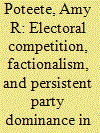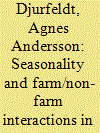|
|
|
Sort Order |
|
|
|
Items / Page
|
|
|
|
|
|
|
| Srl | Item |
| 1 |
ID:
111611


|
|
|
|
|
| Publication |
2012.
|
| Summary/Abstract |
Primarily aiming to highlight and exemplify how a technology can be socially and culturally appropriated, this article draws attention to the role of mobile phone communication in straining relations between married couples on the basis of material from Ethiopia. The findings show that mobile phone-mediated interactions between spouses are filled with monitoring and controlling activities, expressed in such forms as checking call logs, text messages, making casual calls, and switching-off phones, leading to highly strained relations that may result in the marital relation as a whole falling apart. These findings show how a technology can actively shape or influence interactions, and reveal interactions that might otherwise be concealed.
|
|
|
|
|
|
|
|
|
|
|
|
|
|
|
|
| 2 |
ID:
111609


|
|
|
|
|
| Publication |
2012.
|
| Summary/Abstract |
The Botswana Democratic Party (BDP) has maintained a super-majority in the National Assembly for over forty years despite increasingly competitive elections. Several factors contribute to the BDP's continued legislative dominance, including features of the electoral system, fragmentation of the party system, and obstacles to strategic voting behaviour. Factional competition has played a particularly important role. Botswana's political institutions encourage factional competition, and factionalism interacts with the electoral system to hinder consolidation of the party system. Botswana's experience underlines the importance of internal party dynamics and their interaction with features of the electoral and party system in enabling the persistence of legislative dominance in competitive electoral systems.
|
|
|
|
|
|
|
|
|
|
|
|
|
|
|
|
| 3 |
ID:
111607


|
|
|
|
|
| Publication |
2012.
|
| Summary/Abstract |
Intergenerational solidarity and reciprocity are fundamental building blocks of any society. Simultaneously, socio-generational groups constantly struggle for influence and authority. In Africa, disproportionately male, gerontocratic and patrimonial systems governing economic, social and political life lend a special explosiveness to the social cleavage of generation. This paper draws on the concept of the generational contract to explore whether Sierra Leone's civil war - labelled a 'revolt of youth' - catalysed changes in the power asymmetries between age groups. I argue that youth question fundamental norms of intergenerational relations, and challenge local governance structures demanding changes to the generational contract. Amidst a strong continuity of gerontocratic dominance and counter-strategies from elders, youth draw on organisational forms and a local human rights discourse to create spaces for contestation and negotiation. These openings hold potential for long-term rearrangements of societal relations.
|
|
|
|
|
|
|
|
|
|
|
|
|
|
|
|
| 4 |
ID:
111610


|
|
|
|
|
| Publication |
2012.
|
| Summary/Abstract |
Since the drafting of Uganda's anti-homosexuality bill in 2009, considerable attention has been paid both in Uganda and across the African continent to the political and social significance of homosexual behaviour and identity. However, current debates have not adequately explained how and why anti-homosexual rhetoric has been able to gain such popular purchase within Uganda. In order to move beyond reductive representations of an innate African homophobia, we argue that it is necessary to recognise the deep imbrication of sexuality, family life, procreation and material exchange in Uganda, as well as the ways in which elite actors (including government officials, the media and religious leaders) are able to manipulate social anxieties to further particular ends. We employ a discourse analysis of reporting in the state-owned newspaper New Vision, first considering how the issue of homosexuality has been represented in relation to wider discourses regarding threats to public morality and national sovereignty. Then, through fieldwork undertaken in Uganda in 2009, we explore three key themes that offer deeper insights into the seeming resonance of this popular rhetoric about homosexuality: constructions of the family, the nature of societal morality, and understandings about reciprocity and material exchange in contemporary Ugandan society.
|
|
|
|
|
|
|
|
|
|
|
|
|
|
|
|
| 5 |
ID:
111606


|
|
|
|
|
| Publication |
2012.
|
| Summary/Abstract |
This article considers the distributional consequences of seasonality by analysing the links between non-farm incomes, commercialisation within agriculture, and variations in consumption burdens and expenditures at the household level. The common focus in the literature on non-farm incomes as levellers of seasonality and sources of risk minimisation is complemented by perspectives which consider how seasonality affects and is handled by households depending on their broader livelihood situations. To this perspective is also added a consideration of in-kind transfers and transactions. The article uses a mixed methods approach, drawing on data from two villages in Western Kenya. The lack of non-farm sources of income and the variation over time in consumption burdens aggravate the seasonal aspects of the agricultural production cycle for poorer households. By contrast, the interaction between farm and non-farm sources of income enables wealthier households to profit from seasonality in relation to agricultural markets, while providing the basis for meeting both farm and non-farm expenditures.
|
|
|
|
|
|
|
|
|
|
|
|
|
|
|
|
| 6 |
ID:
111608


|
|
|
|
|
| Publication |
2012.
|
| Summary/Abstract |
The abduction of two Frenchmen in January 2011 in Niamey's supposedly most secure neighbourhood has led many to question the functioning of the city's security apparatus. This paper analyses Niamey's security landscape, initially from an historical and then from a spatial perspective. It argues that for a comprehensive analysis of security, we must first decentre our perspective on security construction, and thus take informal non-organised modes of policing just as seriously as policing by state and vigilante organisations; and second, take into account the inseparability of sociality and security, a fragile balance of trust and acceptable risk. In conclusion I argue that this focus may be one way of comprehending the kidnapping: how was it possible and what were its implications for Niamey's security landscape?
|
|
|
|
|
|
|
|
|
|
|
|
|
|
|
|
|
|
|
|
|